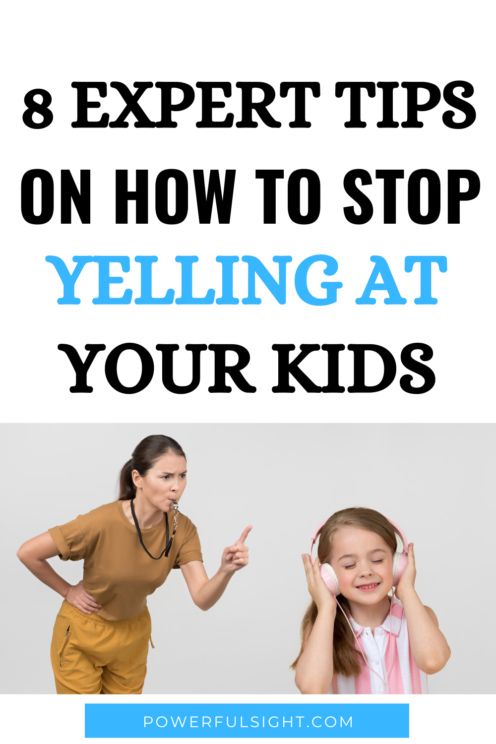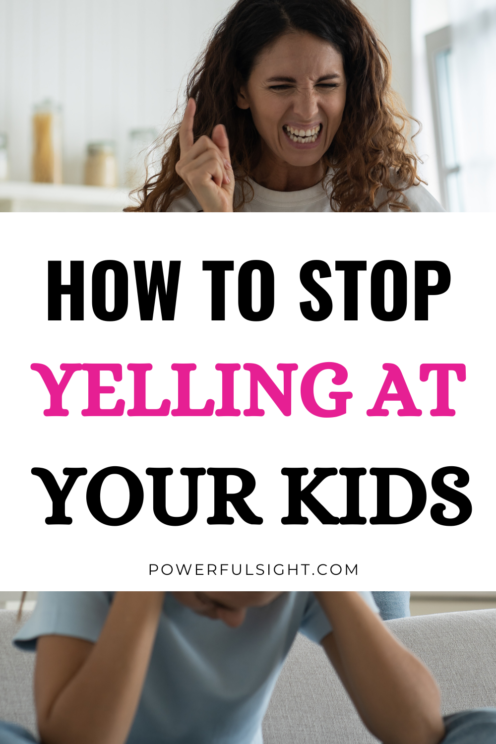If you are in the habit of yelling at your kids, it is common to almost every parent. Continue reading to figure out how to stop yelling at your kids and rather adopt a better way to discipline them.
Impact of yelling at kids
Yelling at your kids can have a profound impact on their emotional well-being and development. While it may feel like an effective way to discipline them in the heat of the moment, studies have shown that yelling can lead to long-term negative consequences. Children who are frequently yelled at may develop low self-esteem, anxiety, and even aggressive behavior. The harshness of yelling can also damage the parent-child relationship, creating a cycle of negative interactions. Recognizing the impact of yelling is the first step towards changing your approach and creating a more peaceful environment for your children.
To truly understand the impact of yelling on children, it’s crucial to consider their perspective. Yelling can be scary and overwhelming for young minds, as they are still learning to regulate their emotions. They may interpret yelling as a sign that they are not loved or valued, leading to feelings of shame and insecurity. Over time, this can erode their self-confidence and trust in their parents. By becoming aware of how yelling affects your children, you can begin to find healthier ways to communicate and discipline.
How to stop yelling at your kids
1. Understand what triggers the yelling
One of the keys to stopping yelling is identifying the triggers that lead to this reaction. Every parent has different triggers, but common ones include fatigue, stress, frustration, and feeling overwhelmed. Take some time to reflect on what pushes your buttons and causes you to resort to yelling.
Is it when your child doesn’t listen the first time? Or perhaps when they engage in challenging behavior? By understanding your triggers, you can start to develop strategies to manage them and respond more calmly.
It can also be helpful to examine your own childhood experiences and how they may be influencing your parenting style. Were you yelled at as a child? If so, you may have learned that yelling is an acceptable form of discipline. However, by breaking this cycle, you can create a healthier and more nurturing environment for your children.
2. Adopt Effective Communication Techniques
An essential aspect of stopping yelling is learning effective communication techniques. Instead of resorting to yelling, try to express your emotions and concerns calmly and assertively. Use “I” statements to share your feelings and avoid blaming or criticizing your child. For example, instead of saying, “You never listen to me,” try saying, “I feel frustrated when I have to repeat myself multiple times.” This approach encourages open dialogue and helps your child understand the impact of their behavior on you.
Active listening is another crucial skill to develop. When your child is speaking, give them your full attention and show genuine interest in what they have to say. Reflect on their words to ensure you understand their perspective. This not only strengthens your bond but also models respectful communication for your child. Fostering a safe and open environment for dialogue can help you reduce the likelihood of yelling.
3. Try to Manage Stress and Emotions
Stress and emotions can often contribute to yelling episodes. It’s important to find healthy ways to manage these feelings so that they don’t escalate into yelling. Engaging in self-care activities such as exercise, meditation, or hobbies can help reduce stress levels and improve your emotional well-being.
Taking a break when you feel overwhelmed can also be a helpful strategy. Step away from the situation for a few minutes to collect your thoughts and regain composure. This break allows you to approach the issue with a calmer mindset, making it easier to find constructive solutions.
Save the pin for later

4. Set Clear Boundaries and Expectations
Clear boundaries and expectations are key to reducing the need for yelling. In almost all my posts, I emphasize so much about boundaries.
Children thrive in an environment with consistent rules and predictability. So, sit down with your child and establish age-appropriate expectations for their behavior. Make sure these rules are clear and understood by both parties. When your child crosses a boundary, calmly remind them of the expectations and the consequences of their actions. By consistently enforcing these boundaries, you can create a sense of security and structure that reduces the likelihood of conflicts escalating to yelling.
5. Adopt Positive Reinforcement and Rewards
Instead of focusing solely on discipline, incorporate positive reinforcement and rewards into your parenting approach. Acknowledge and praise your child’s good behavior, even for small accomplishments. This positive feedback reinforces their self-esteem and encourages them to continue making positive choices.
Setting up a reward system, such as a sticker chart or a special treat, can also motivate your child to meet expectations without resorting to yelling. Remember, positive reinforcement doesn’t mean ignoring negative behavior. It simply means shifting the focus towards praising and encouraging desired behavior rather than solely punishing unwanted behavior.
6. Model Calm Behavior
Children learn by observing their parents, so it’s crucial to model calm behavior even in challenging situations. Take a deep breath and count to ten before reacting to your child’s behavior. This pause allows you to respond thoughtfully rather than impulsively. Use a calm and assertive tone of voice when addressing your child, even if you feel frustrated. By modeling calm behavior, you teach your child valuable emotional regulation skills and demonstrate healthy ways to handle stress.
If you do find yourself yelling, take responsibility for your actions and apologize to your child. This teaches them the importance of taking accountability and making amends when we make mistakes.
7. Seeking Support and Resources
Parenting can be challenging, and it’s important to seek support when needed. Reach out to other parents, join parenting groups, or seek guidance from professionals. They can provide valuable insights, practical advice, and emotional support. Remember, you are not alone in your journey to stop yelling and create a more peaceful home environment.
8. Creating a Peaceful Home Environment
Creating a peaceful home environment goes beyond just stopping yelling. It involves fostering love, empathy, and open communication. Encourage family bonding through activities such as family dinners, game nights, or shared hobbies. Create a routine that provides structure and predictability for your child. Ensure that your home is a safe space where your child feels heard and valued. By nurturing a peaceful home environment, you lay the foundation for your child’s emotional well-being and healthy development.
Conclusion
Yelling at your kids is not an effective or healthy way to discipline them. The impact of yelling can have long-lasting negative consequences on their emotional well-being and the parent-child relationship.
Managing stress and emotions, setting clear boundaries and expectations, and using positive reinforcement are essential strategies for stopping yelling. Also, try to model calm behavior and seek support when needed. In addition to the aforementioned, create a peaceful home environment where you provide your child with the love, support, and guidance they need to thrive.
If you found this post helpful, drop your comment below and share this post to others.
Save the pin for later.

- 8 Reasons You Wake Up Tired After A Full Night Sleep - 13/02/2026
- 150 Juicy Never Have I Ever Questions for Teenagers - 12/02/2026
- My Partner Is Always Angry And Negative: Here’s What To Do - 11/02/2026

